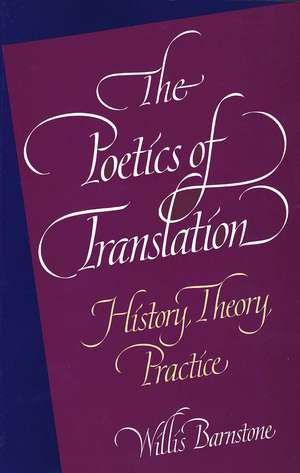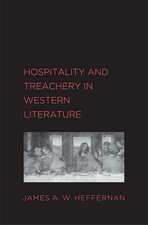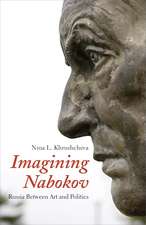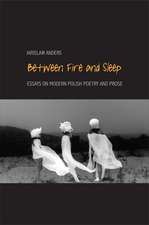The Poetics of Translation: History, Theory, Practice
Autor Willis Barnstoneen Limba Engleză Paperback – 22 feb 1995
In a lucid, pioneering volume, Willis Barnstone explores the history and theory of literary translation as an art form. Arguing that literary translation goes beyond the transfer of linguistic information, he emphasizes that imaginative originality resides as much in the translation as in the source text—a view that skews conventional ideas of artistic primacy.
Barnstone begins by dealing with general issues of literalness, fidelity, and originality: with translation as metaphor, aesthetic transformation, and re-creation. He looks as well at translation as a traditionally stigmatized genre. Then he discusses the history of translation, using as his paradigm the most translated book in the world, the Bible, tracing it from its original Hebrew and Greek to Jerome's Latin and the English of Tyndale and the King James Version. Citing the way authors intentionally mistranslate for religious and political purposes, Barnstone provides fascinating insights into how, by altering names in the Gospels, the Virgin Mary and Jesus cease to be Jews, the Jews are turned into villains, and Christianity becomes an original rather than a mere translation. In the next section Barnstone analyzes translation theory, ranging from the second century B.C. Letter of Aristeas to Roman Jakobson's linguistic categories and Walter Benjamin's "Task of the Translator." The book ends with an aphoristic ABC of translating.
Barnstone begins by dealing with general issues of literalness, fidelity, and originality: with translation as metaphor, aesthetic transformation, and re-creation. He looks as well at translation as a traditionally stigmatized genre. Then he discusses the history of translation, using as his paradigm the most translated book in the world, the Bible, tracing it from its original Hebrew and Greek to Jerome's Latin and the English of Tyndale and the King James Version. Citing the way authors intentionally mistranslate for religious and political purposes, Barnstone provides fascinating insights into how, by altering names in the Gospels, the Virgin Mary and Jesus cease to be Jews, the Jews are turned into villains, and Christianity becomes an original rather than a mere translation. In the next section Barnstone analyzes translation theory, ranging from the second century B.C. Letter of Aristeas to Roman Jakobson's linguistic categories and Walter Benjamin's "Task of the Translator." The book ends with an aphoristic ABC of translating.
Preț: 334.79 lei
Nou
Puncte Express: 502
Preț estimativ în valută:
64.06€ • 67.19$ • 53.33£
64.06€ • 67.19$ • 53.33£
Carte tipărită la comandă
Livrare economică 01-15 aprilie
Preluare comenzi: 021 569.72.76
Specificații
ISBN-13: 9780300063004
ISBN-10: 0300063008
Pagini: 314
Dimensiuni: 152 x 229 x 19 mm
Greutate: 0.46 kg
Ediția:Revised
Editura: Yale University Press
Colecția Yale University Press
ISBN-10: 0300063008
Pagini: 314
Dimensiuni: 152 x 229 x 19 mm
Greutate: 0.46 kg
Ediția:Revised
Editura: Yale University Press
Colecția Yale University Press















